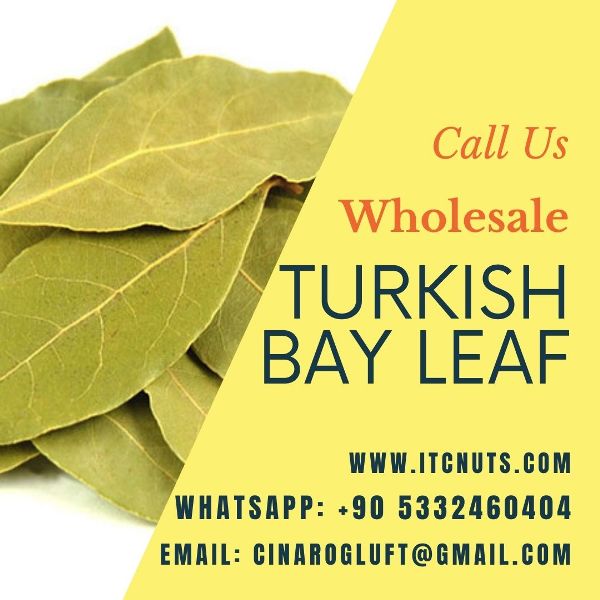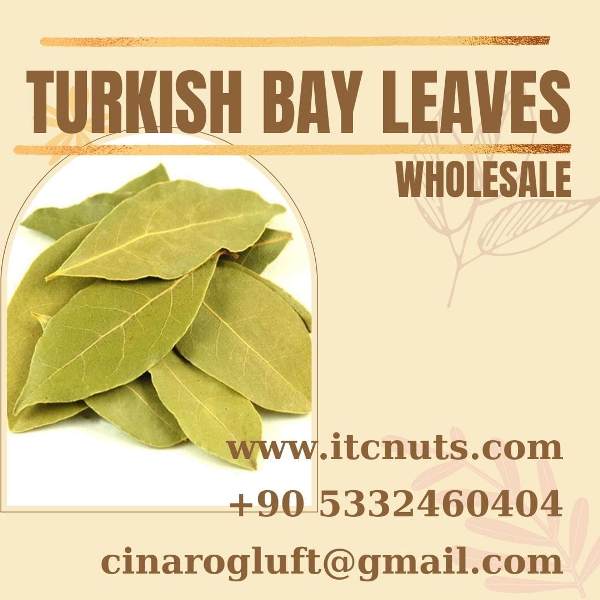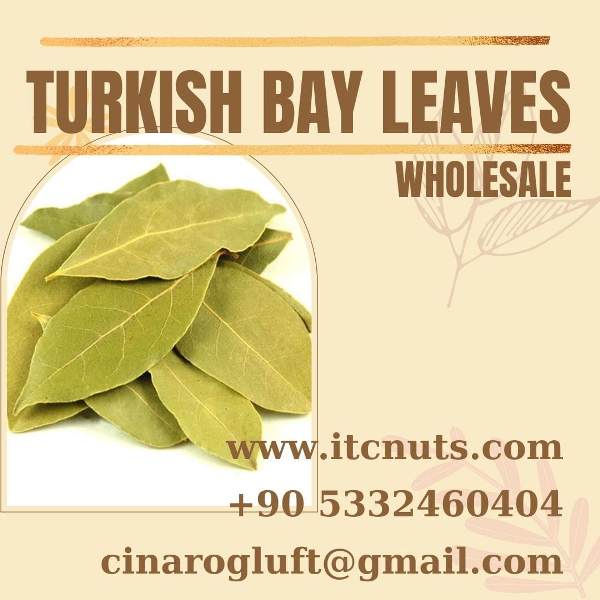Understanding Turkish Bay Leaves and Their Global Appeal
Bay leaves, particularly those from Turkey, are widely appreciated for their quality and flavor. Turkish bay leaves are recognized for their deep green color, aromatic scent, and distinct taste that enhances many culinary dishes. Turkey is a leading exporter of bay leaves, providing about $50 million worth annually to countries across the globe. The wholesale market for Turkish bay leaves has been robust due to their superior quality and the country’s rich laurel forests that supply the raw materials.

Turkish Laurel Leaves Wholesale: A Key Ingredient
Turkish laurel leaves, commonly known as bay leaves, play a central role in Mediterranean cuisine and beyond. The leaves are harvested, dried, and sold to wholesalers globally. Turkey’s laurel leaves are favored by wholesalers for their consistent quality, making them ideal for culinary use in large-scale food production. Their pleasant fragrance, coupled with their ability to enhance flavors in stews, soups, and sauces, makes them an indispensable product for food producers worldwide.

Turkish Laurel Leaves Manufacturer: Ensuring Top Quality
As a Turkish laurel leaves manufacturer, Turkey offers both standard and semi-select bay leaves for different markets. The manufacturing process involves hand-picking the finest leaves, ensuring they are of uniform size and color, before drying them to preserve their aroma. Turkish laurel leaves manufacturers play a pivotal role in delivering top-quality products for various international markets, including Asia, Europe, and North America. The attention to detail in the manufacturing process guarantees that the final product meets global standards.

Turkish Bay Leaves Prices: Competitive and Reasonable
Turkish bay leaves are competitively priced, making them an attractive option for importers worldwide. The price of Turkish bay leaves varies depending on the grade (standard or semi-select) and the packaging size. For instance, standard select bay leaves, primarily targeted at the Chinese and Far East markets, are often packed in 25kg or 50kg PP or jute bags. Meanwhile, semi-select bay leaves, typically exported to Europe, the USA, and Canada, are also competitively priced to meet the demands of these markets. Turkey’s ability to provide high-quality bay leaves at reasonable prices has cemented its place as a top exporter.
Turkish Laurel Leaves Prices: Affordable for All Markets
The price of Turkish laurel leaves, also known as bay leaves, is driven by demand from various regions, particularly in Asia, Europe, and North America. With Turkey being a major supplier, the prices are kept stable to accommodate both large wholesalers and smaller buyers. The high-quality leaves, whether standard or semi-select, are available at different price points, ensuring a steady supply to meet international demand. The pricing also takes into account the extensive experience in manufacturing and the care taken in selecting and processing the leaves.
Bay Leaf Benefits: Health and Culinary Uses
Bay leaves offer numerous benefits beyond their culinary use. Bay leaves are rich in vitamins, minerals, and antioxidants, making them an excellent addition to a healthy diet. The leaves are known to aid digestion, reduce inflammation, and improve heart health. The use of bay leaves has been linked to better blood sugar control and reduced risk of certain diseases. These health benefits have boosted the demand for bay leaves, especially in regions like the USA and Europe, where consumers are more health-conscious.
Bay Leaves Benefits: A Natural Remedy
The benefits of bay leaves extend to traditional medicine, where they are used for their soothing and healing properties. Bay leaves have been used for centuries to treat respiratory issues, reduce stress, and relieve aches and pains. The antioxidant properties of bay leaves help fight free radicals in the body, which can cause cellular damage. Additionally, bay leaves are often used in home remedies to support immune function, improve digestion, and promote relaxation.
Bay Leaf in Amharic: A Cultural Staple in Ethiopia
Bay leaf in Amharic is known as “አዝማድ” (Azmad), and it holds a special place in Ethiopian cuisine. The use of bay leaves in traditional Ethiopian stews, such as Doro Wat and other rich, flavorful dishes, is well established. Ethiopian cooks often add bay leaves to simmering dishes to enhance the depth of flavor and aroma. The popularity of bay leaves in Ethiopian households contributes to a steady demand for bay leaf imports, particularly from Turkey, where high-quality laurel leaves are available in large quantities.
Benefits of Bay Leaves in Everyday Life
Beyond their medicinal and culinary uses, bay leaves are also used in cosmetics, essential oils, and other products for their fragrant properties. The benefits of bay leaves include their ability to repel insects, cleanse the air, and provide natural fragrance to homes. In some cultures, bay leaves are used in spiritual practices, believed to ward off negative energy and promote peace and well-being.
Turkish Bay Leaf: A Key Export for Asia
Turkey has a strong foothold in exporting bay leaves to Asia, particularly to countries like China, Taiwan, Thailand, the Philippines, Vietnam, and Japan. The Turkish bay leaf is highly regarded in these markets for its strong aroma and culinary versatility. In these Asian countries, bay leaves are used in traditional dishes, sauces, and soups, and their importance continues to grow. Turkish bay leaves for the Chinese market are often packed in bulk, with standard select quality bay leaves packed in 25kg or 50kg bags to meet the needs of wholesalers. The demand for Turkish bay leaves in Asia remains steady due to their high quality and favorable pricing.
Turkish Laurel Leaves for the European Market
The European market is a major consumer of Turkish laurel leaves, with countries like Germany, France, Italy, and Spain importing significant quantities. European wholesalers and food manufacturers appreciate the semi-select Turkish bay leaves for their consistent quality and rich flavor. These leaves are commonly used in Mediterranean cuisine, where they add depth to soups, sauces, and stews. European buyers often seek semi-select bay leaves for their uniformity and competitive pricing, ensuring a strong trade relationship with Turkish exporters.
Turkish Bay Leaves for USA and Canada Market
The USA and Canada are growing markets for Turkish bay leaves, particularly in the food production and spice industries. Semi-select Turkish bay leaves are favored for their quality, making them a preferred choice for American and Canadian wholesalers. The use of bay leaves in slow-cooked dishes, soups, and stews is widespread in North American cuisine, and Turkish bay leaves are a trusted product due to their high-quality production standards. The demand for bay leaves in the USA and Canada is expected to grow, with Turkey well-positioned to meet this demand.
Turkish Bay Leaves for African Markets
African countries, particularly Ghana, Senegal, and South Africa, have seen an increasing demand for Turkish bay leaves. These countries use bay leaves in various traditional dishes, and the health benefits associated with the spice have also boosted its popularity. Turkey exports both standard and semi-select bay leaves to African markets, with competitive pricing making Turkish bay leaves a viable option for wholesalers in these regions.
Bay Leaf Flavor: Enhancing Global Cuisines
The unique flavor of bay leaves is what makes them an essential ingredient in kitchens worldwide. Bay leaf flavor is earthy, slightly bitter, and adds complexity to dishes, especially when simmered over time. The flavor of Turkish laurel leaves is particularly strong due to the specific climate and soil conditions in Turkey’s laurel forests. This makes Turkish laurel leaves a favored choice for chefs and food manufacturers alike.
Scientific Name of Bay Leaf: Laurus nobilis
The scientific name of bay leaf is *Laurus nobilis*, a species native to the Mediterranean region. This evergreen tree produces aromatic leaves that have been used for centuries in cooking and medicine. The species thrives in the warm climate of Turkey, making it a top exporter of high-quality bay leaves. The scientific name *Laurus nobilis* is synonymous with quality and authenticity in the global spice trade.
Conclusion: Turkish Bay Leaves Global Impact
Turkish laurel leaves, also known as laurel leaves, are an important export product for Turkey. With a robust wholesale market, competitive prices, and high-quality production, Turkey continues to be a leading supplier of bay leaves to various regions, including Asia, Europe, North America, and Africa. The growing demand for bay leaves, driven by their health benefits and culinary uses, ensures that Turkish laurel leaves remain a staple in kitchens and industries around the world.
